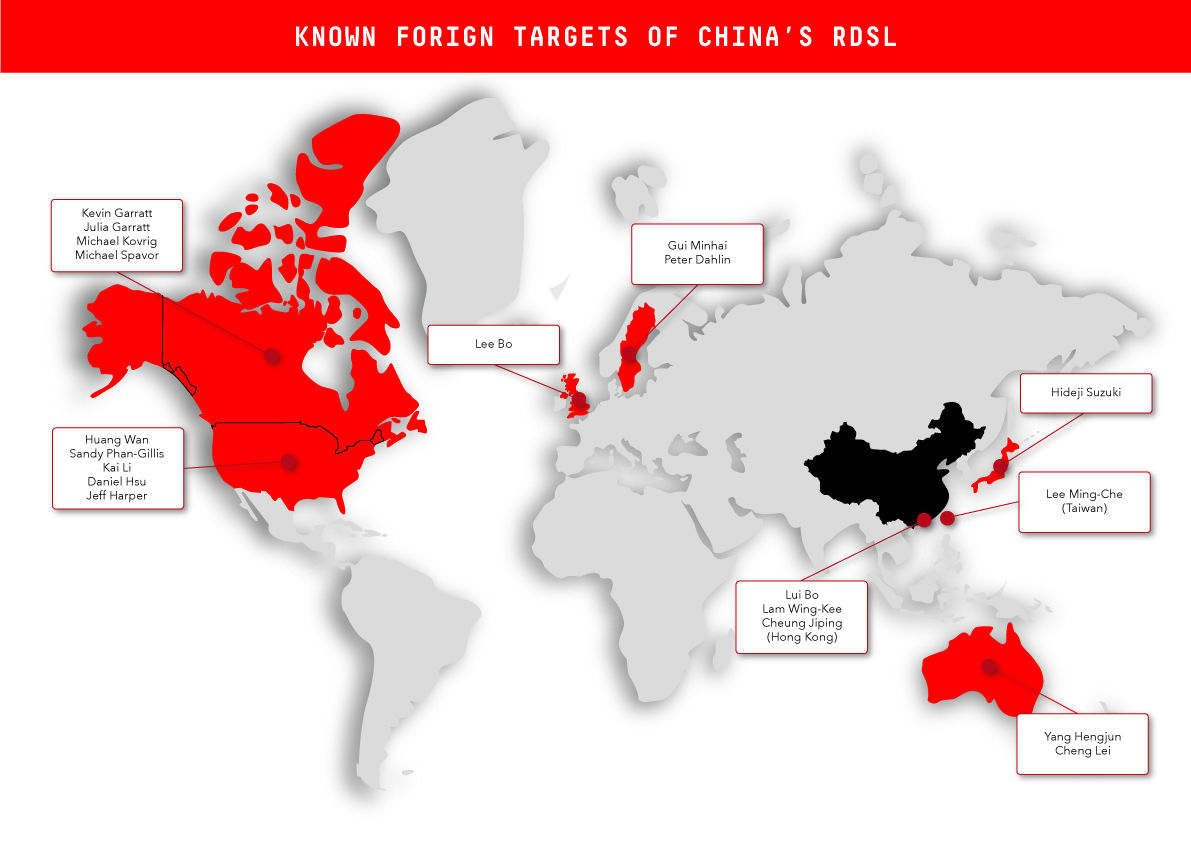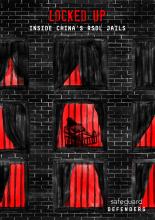Tortured in secret Chinese jail: Japanese man describes his ordeal
After spending a month in one of China’s secret RSDL jails where the windows were always covered, Japanese prisoner Hideji Suzuki asked if he could see the outside.
And then just for one time and for just 15 minutes, his jailors opened the curtains.
When he saw the sky, Suzuki cried.
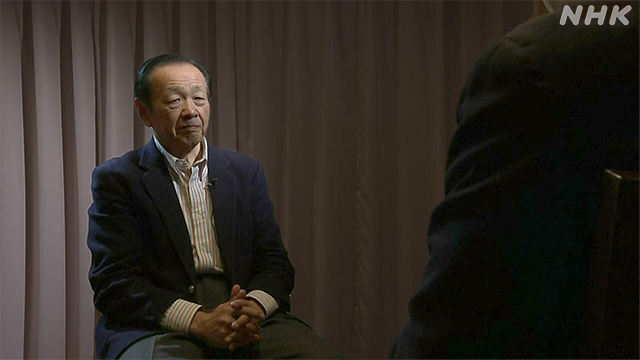
Hideji Suzuki, the former President of Japan China Youth Exchange had travelled hundreds of times between the two countries over the past 30 years. This time was different. He was on his way to Beijing International Capital Airport in the summer of 2016 to fly back home to Japan when he disappeared.
China’s state security agents bundled him into a van and kept him locked up in a Residential Surveillance at a Designated Location (RSDL) facility for the next seven months. RSDL is a notorious system where the suspect is kept incommunicado without access to a lawyer for months at a time. It is a system that has been condemned by the UN as tantamount to torture.
Altogether Suzuki spent six years in RSDL, a detention centre and prison, but he said the hardest part of his ordeal was his time in RSDL.
After seven months of RSDL, Suzuki was arrested on spying charges and later sentenced at a secret trial to six years in jail. He vehemently denies these accusations. After being released on October 2022, he spoke to Japanese press in November and December about his ordeal.
This article is based on English translations published just a few weeks ago of two interviews Suzuki, now 65 years old, gave to NHK and Chūō Kōron. Additional details were provided by a four-part series in English published in Mainichi Shimbun published earlier.
Our 2021 report, Locked Up: Inside China’s Secret RSDL jails (link to PDF file) is a deep dive into what life inside RSDL is like. Suzuki’s story strongly correlates to what our research found and is documented in that report.
PART ONE: THE RAID
Suzuki was grabbed as soon as he arrived at the airport. It was a hot summers day in July 2016. He got out of his taxi and walked towards the entrance when five or six men pulled him into the back of a van parked nearby.
They took away his phone, watch and belt. They told him they were state security officers, but only showed him official paperwork after he kept insisting.
Then they blindfolded him and then drove for about an hour before they arrived at their destination.
PART TWO: INSIDE RSDL
When they arrived, they took Suzuki, still blindfolded up in an elevator. “In order to make me lose my bearings, I was put into a room after walking around while rotating my body many times,” he said.
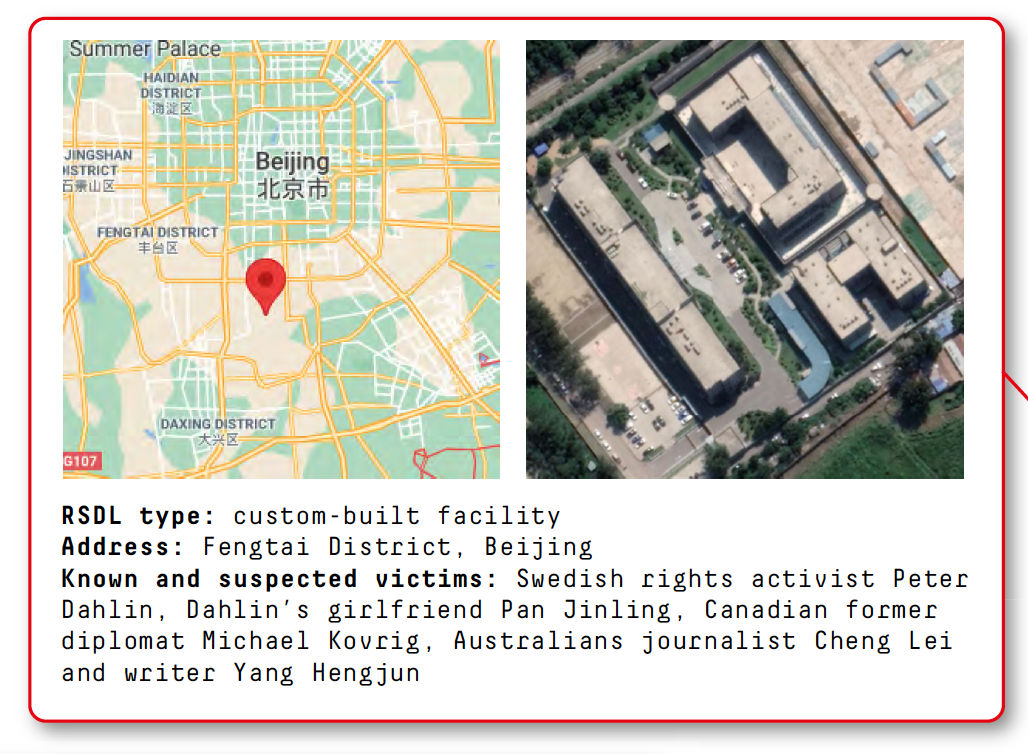 RSDL facility locations are kept secret. But after his release Suzuki guessed that he was kept at the same secret jail as several other famous foreign RSDL prisoners including Safeguard Defenders' Director Peter Dahlin and Canadian ex-diplomat Michael Kovrig. [SD believes this to be incorrect, and that Suzuki was kept at a different facility, run by the MPS]
RSDL facility locations are kept secret. But after his release Suzuki guessed that he was kept at the same secret jail as several other famous foreign RSDL prisoners including Safeguard Defenders' Director Peter Dahlin and Canadian ex-diplomat Michael Kovrig. [SD believes this to be incorrect, and that Suzuki was kept at a different facility, run by the MPS]
The facility is in the south Beijing district of Fengtai.
He was kept in what looked like an old Chinese guesthouse room; the room number was 502.
Interrogations took place in Room 504, diagonally across the hallway. It is against the Criminal Procedure Law to interrogate someone under RSDL in the same facility they are being held in.
His main interrogator told him to call him “teacher” but did not initially identify himself by name.
It had a bed, two armchairs, a small desk and thick curtains that remained closed. The bathroom was always kept open so they could watch him at all times.
DAILY LIFE
“It was the beginning of a life of interrogation and surveillance that lasted for nearly seven months.”
He was watched 24 hours a day by at least two guards, working in shifts. They never talked to him.
He could not write or read or watch TV. He didn’t even know what time it is was because they had taken away his watch. He had nothing to do except think about his next interrogation.
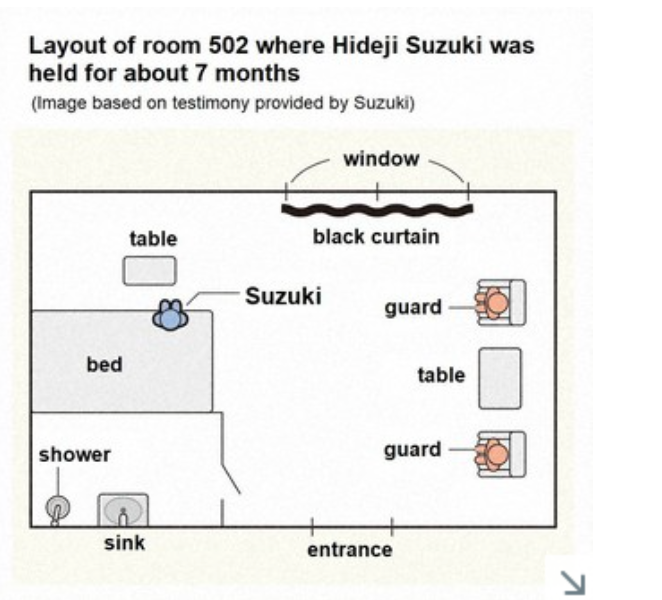
“I spent the seven months of interrogation in this room with no one to talk to.”
He was also watched by four surveillance cameras attached to the corners of the room.
The lights were left on 24 hours making it hard to sleep.
For breakfast he was given a single steamed bun. He would sit on the bed and eat it in silence.
As he paced about he was consumed with worry about his fate.
"Since I didn’t know how long my life under this surveillance would continue and didn’t have any information at all, I got to have suspicious and doubtful about everything. What was going on back home in Japan? How was my family getting along? I was always thinking about those things. It was very difficult.”
The windows were covered with dark, thick curtains so Suzuki could not even tell whether it was day or night.
One day, he begged to be able to see outside. They ordered him to sit on a chair a little distance from the window and then opened the curtains for 15 minutes.
“Tears flowed down my face,” he remembered. When he tried to get closer to the window his guards ordered him to stay seated.
CONSULAR ACCESSS
Although he was denied a lawyer during RSDL, he was eventually allowed to meet with Japanese consular staff.
Five days after he was first disappeared, they took him to a large reception room in the facility. The meeting was filmed and his interrogators and interpreters were present.
Later, in February 2017, he was taken out of RSDL, formally indicted and held in regular detention. His consular meetings then moved to a courthouse. While he was at the courthouse waiting he was kept in a cage that looked like it was for an animal, he remembered.
RELEASE
By the time of his release from prison in 2022, Suzuki had lost 30kg in weight.
Now back in Japan, Suzuki continues to speak out about his treatment and human rights in China. He told NHK that at least 16 other Japanese men have been arrested in China on spying charges since 2015, of which one man in his 70s had died in Chinese prison.
Suzuki is just one of many foreigners who have been locked up in RSDL. The list spans NGO workers to basketball players. Below is a map of known cases and includes one victim, US citizen Kai Li, who is still behind bars.
